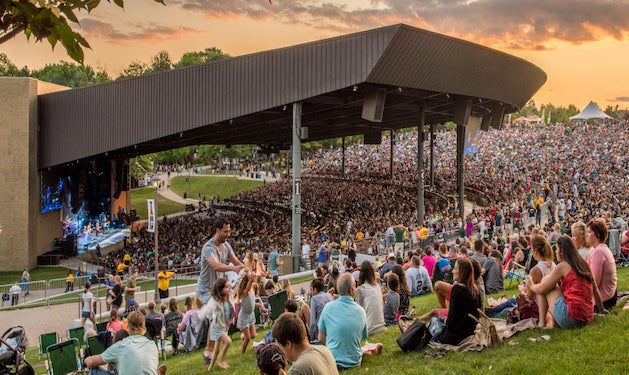Richie Havens
Richie Havens wasn’t scheduled to be the opening act of the Woodstock festival, but, in retrospect, it is hard to imagine anyone else doing it.
Day One, Performer One: Richie Havens
Performed Friday afternoon, August 15, 5:00–5:45 p.m.
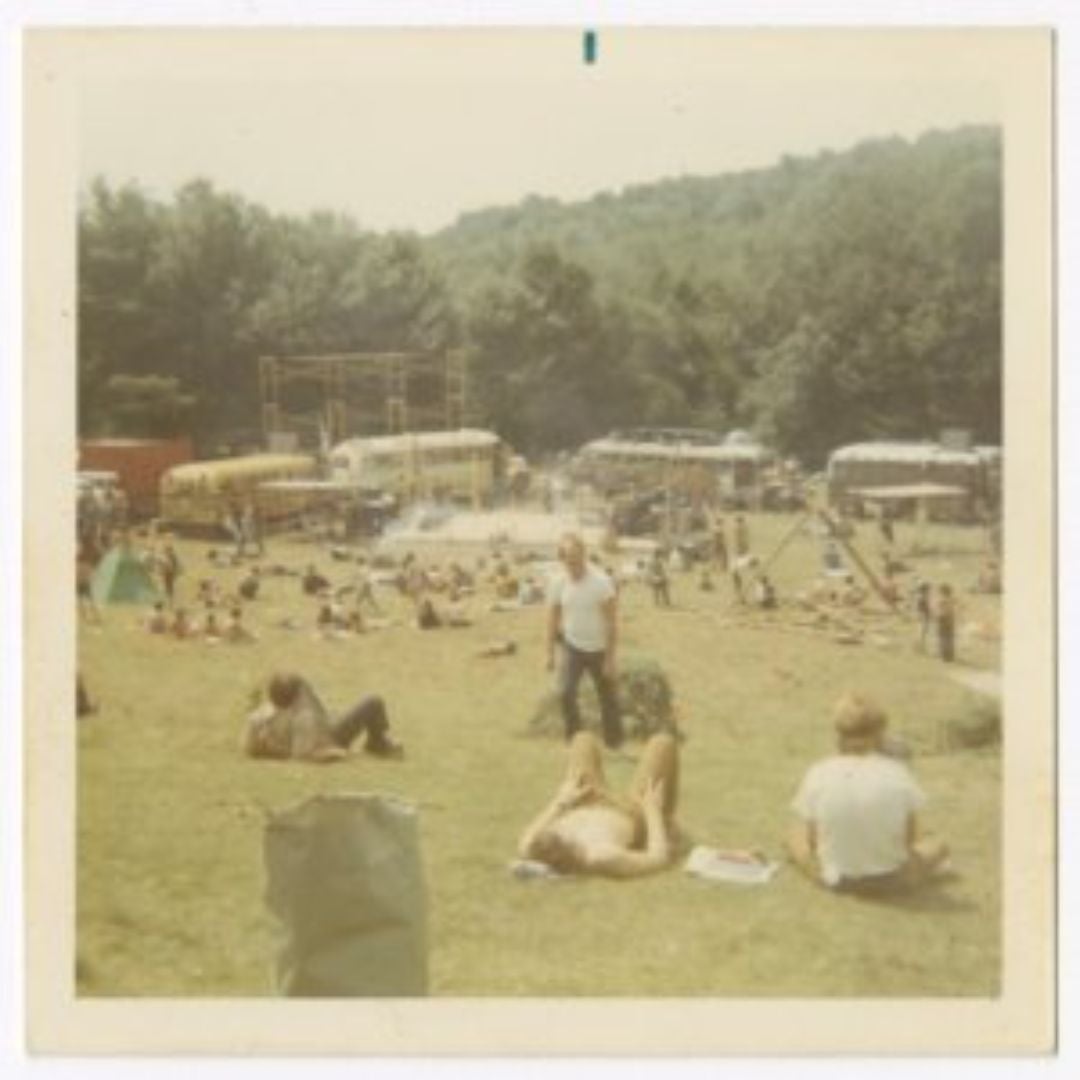
Richie Havens Band Members
- Richie Havens: guitar, vocals
- Paul “Deano” Williams: guitar
- Daniel “Natoga” Ben Zebulon: percussion, congas
Richie Havens Woodstock Setlist
- From the Prison/Get Together/From the Prison
- I’m a Stranger Here
- High Flyin’ Bird
- I Can’t Make It Anymore
- With a Little Help from My Friends
- Handsome Johnny
- Medley: Strawberry Fields Forever/Hey Jude
- Freedom (incl. Motherless Child)
The time for the festival to start had come and gone, all the roads leading to the festival were hopelessly congested with cars and people, and the audience was getting restless. Richie, Deano, and Daniel had been flown in by helicopter, and their setup was minimal, so festival organizers urged them to take the stage. The rest is history. Richie Havens grew up in the Bedford-Stuyvesant section of Brooklyn. His parents instilled in him a love of music, and in his teens, he formed and nurtured several doo-wop groups that regularly performed on street corners and local talent competitions. He was attracted to the creative atmosphere of Greenwich Village, with its Beat poets, comedians, musicians, and artists, and in 1961 he made the move. He drew portraits of the tourists in the Village by day, and he frequented the coffeehouses and clubs by night. He taught himself to play guitar to accompany the poetry he was writing, and began playing at Café Wha? and other Village clubs, often playing multiple sets at multiple clubs each night. He also made lasting friendships and connections with the other singer/songwriters and industry insiders. Richie quickly gained a reputation for his genuine, energetic performances in the Village, interpreting others’ songs and interspersing his own compositions. He describes his playing style in his autobiography as follows:
Instead of placing my fingers in the right places on the right strings to make traditional chords, I changed the tuning of a few strings to make a complete chord without pressing down on the fret board at all. By tuning the guitar in this way—to an “open chord”—and by strumming all six strings together, it took me all of ten seconds to realize I could slide my thumb along the neck of the guitar to make different chords at every fret stop. …When I learned a song, I automatically felt the tempo to sing it; the strumming was there to fill in the gaps between lines and to emphasize anticipations, pickups, and turnarounds. The other odd thing was that my left foot became my body metronome. I tapped it heel to toe, which gave me a rhythm to play the guitar against.
In 1963, Richie met Albert Grossman, the man who would make stars of most of the major Greenwich Village musicians: Bob Dylan, Odetta, Gordon Lightfoot, and Peter, Paul and Mary, to name a few. Grossman suggested that Richie record some of his songs, and Richie signed a production contract, giving him the studio time he needed. Over the next three years, none of the recordings were released, and the arrangement didn’t result in any bookings or tours. But Richie continued playing to larger and larger audiences and paying his dues. Richie’s big break came in 1967 when veteran record executive Jerry Schoenbaum created the Verve Folkways label at MGM Records. The first four artists on the new label were Janis Ian, Tim Hardin, The Blues Project, and Richie Havens. Schoenbaum advised Richie to avoid a purely folk album and, instead, suggested that he record what he was actually playing in the clubs: a mixture of ballads, folk songs, blues, and jazz. The resulting album, Mixed Bag was released in late 1967 and included The Beatles’ “Eleanor Rigby,” Dylan’s “Just Like a Woman,” Billy Ed Wheeler’s “High Flyin’ Bird,” Jerry Merrick’s “Follow,” and “Handsome Johnny” by actor and long-time Havens friend Lou Gossett, Jr.
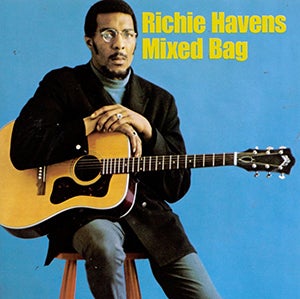
Mixed Bag sold well and was critically acclaimed. Richie played “Handsome Johnny” on The Tonight Show, receiving a standing ovation from the studio audience that lasted through the commercial break, and Johnny Carson asked Richie for another song AND invited him back the following night.
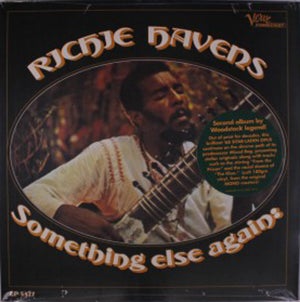
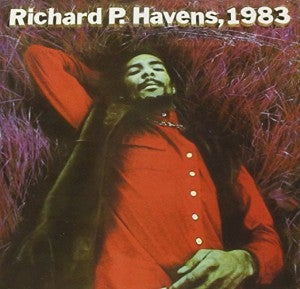
The follow-up album, Something Else Again, was released in 1968 and solidified Richie’s reputation and popularity, and in 1969, as he was completing Richard P. Havens: 1983, his third album of a three-record deal with Verve Folkways, his relationship with Albert Grossman began to sour. Richie negotiated a deal with MGM for his own label, and Grossman was out of the picture. Richard P. Havens: 1983 (the title is a reference to George Orwell’s book, 1984, and a warning that there is still time to change, but time is running out) was released in May 1969 and reached #80 on the Billboard Top 200 chart. It was at this moment in Richie Havens’ career, as he was achieving artistic and commercial success and was asserting his authority to set his own direction, that he was booked for the Woodstock Music and Art Fair to be held in upstate New York.
The Woodstock festival had been scheduled to begin on Friday afternoon. Sweetwater was the planned first act. The audience had been streaming onto the festival site for days, in numbers far exceeding expectations, and traffic had already clogged all roads leading to the festival for dozens of miles. Sweetwater and their equipment were stuck in Liberty, normally a 20-minute drive away, but now accessible only by helicopter. Richie and his bandmates, Deano Williams and Daniel Ben Zebulon, had been flown to the festival site in a small helicopter that landed behind the stage. Tim Hardin was also on-site, along with a few other performers. As the start time came and went, Michael Lang pleaded with Hardin to take the stage and open the festival. Hardin adamantly refused, reminding Lang that he was supposed to go on fifth. Lang appealed to Richie, who finally, reluctantly agreed, telling the festival promoter that he would owe him big-time if anyone threw any bottles at him. Richie’s bass player, Eric Oxendine, was still stuck in traffic, but Richie agreed to perform without him.
At approximately 5:15 on Friday afternoon, Richie, Deano, and Daniel walked onto the still unfinished stage, sat down, and began to play their 20-minute set. They opened with “From the Prison” from Richie’s Something Else Again album, with a bit of the Youngbloods’ “Get Together” thrown in for good measure. He followed with “I’m a Stranger Here,” which was one of the demos he recorded before signing with Verve Folkways. He concluded his set with two songs from his debut album, “High Flyin’ Bird” and “I Can’t Make It Anymore.” Still with no act ready to follow Richie, Michael Lang convinced him to do an encore. Richie attempted to play “With a Little Help from My Friends,” the Beatles cover from his newly released 1983 album. He obviously had trouble remembering the lyrics, so he asked the audience to sing along. Later in the festival, Joe Cocker would also perform the song, creating one of the most memorable moments of Woodstock. Richie then redeemed himself with a second encore, a performance of “Handsome Johnny” from Mixed Bag. He returned for a third encore at Michael Lang’s insistence, a medley of the Beatles’ “Strawberry Fields Forever” from his 1983 album and “Hey Jude.”
Finally, exhausted and at a loss to remember any additional songs, Richie Havens began playing a guitar groove. The word “freedom” came to his mind, and he began singing. He added a few lines from the traditional song, “Motherless Child,” and a new song, an anthem for the Woodstock festival, was created live on stage. The song, "Freedom" was immortalized in the Oscar-winning 1970 documentary film, Woodstock, and the film’s soundtrack album and became a staple of Richie’s performances the rest of his career. Richie told the story many times about having to go to the theater and watch the movie to learn the song he had extemporaneously written on the Woodstock stage. Woodstock was a defining moment for Richie Havens, and he would reference his performance at the festival for the rest of his career.
Guitarist Paul “Deano” Williams accompanied Richie throughout his career, also contributing to a 2000 Pete Farrow album. Daniel Ben Zebulon is still active as a musician and has played percussion with Andy Gibb, Stevie Wonder, Dionne Warwick, and the Bee Gees. Over his career, Richie Havens released 24 albums, including the well-received Stonehenge (1970), The Great Blind Degree (1971), and Alarm Clock (1971) on his own label and a number of albums on various labels. He would release his final album, Nobody Left to Crown, in 2008. He was a tireless live performer who thrived on personal contact with his fans. In addition to his music,
Richie Havens devoted his life to educating young people about ecological issues. He co-founded the Northwind Undersea Institute, an oceanographic children’s museum in the Bronx, and helped create The Natural Guard, an organization described as “a way of helping kids learn that they can have a hands-on role in affecting the environment.” Havens died on April 22, 2013, at the age of 72, and his ashes were spread on the site of his beloved Woodstock festival, here at Bethel Woods, at a memorial service attended by many of his friends, family, and fans on the 44th anniversary of the last day of the festival.
—Wade Lawrence & Scott Parker
